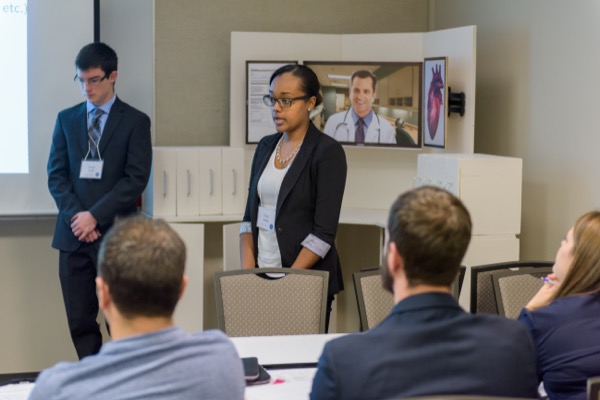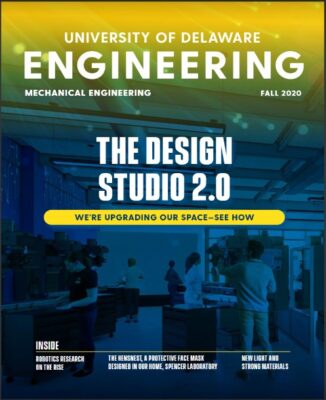Engineering students collaborate across disciplines to solve problems
The University of Delaware’s Multidisciplinary Senior Design Final Review on Dec. 16 showcased almost 40 projects completed by teams of students in biomedical engineering, civil and environmental engineering, electrical and computer engineering, and mechanical engineering.
Local registered dietitian Jennifer Linton partnered with students in the course to improve patient care in her own practice. Linton, who earned a master’s degree in health promotion at UD in 2012, recently launched a start-up company, Therapeutic Nutrition LLC, and she has developed a proprietary concept to provide adequate nutritional support to her critically ill patients.
She turned to a team of three biomedical engineering seniors, Kimberly Rowe, Austin Barth and Michaela Schulman, to design the first prototype of her concept.
“The biggest challenge for us as biomedical engineering majors was learning 3-D design,” said Rowe. “But it was really rewarding to have a tangible product to hand off at the end of the semester.”
The team will continue to work on their prototype in the spring in an upper-division research methods class, focusing on biomechanical testing of their prototype, and they will remain engaged with Linton as she continues to grow her company.
“It’s very rewarding for our students to work with clinician entrepreneurs like Jen Linton,” said the team’s faculty adviser, assistant professor of mechanical engineering Jenni Buckley. “There’s a lot on the line when you’re the first engineering team working with a start-up company. This team did a great job delivering for Jen, and she’ll be able to use the team’s work to build her business.”
Other projects addressed a broad range of engineering challenges, from designing a more efficient hydroponic system for growing lettuce to creating a robot that aids in inspecting and measuring for roof replacement.
Three teams worked on refining products for SimUCare, a line of devices for use in training clinicians through UD’s Healthcare Theatre program.
In addition, groups developed a solution for recycling unsold materials for Goodwill Industries and an automated guitar string coating process for W.L. Gore and Associates.
“Automating this process is a problem we’ve been struggling with for awhile, and senior design is a great way for us to get fresh ideas for concepts that our engineers can carry forward,” said Gore’s Mike Hawley, who completed his bachelor’s degree in mechanical engineering at UD in 2001.
The student teams worked with construction companies, clinicians, materials suppliers, manufacturing companies, restaurateurs, and others in their work, which addressed a broad range of topics from telemedicine and assisted mobility to desalination and concussion.
One group worked on a project for Agoge Automation LLC, a company started by electrical engineering major Adam Engelson, inventor of an autonomous silverware wrapping machine aimed at optimizing restaurant operations.
The four students created a first-generation machine that will be beta-tested at a TGI Fridays restaurant in New Jersey as well as at Grain, a new gastropub in Newark, Delaware, in early 2016.
They considered issues such as performance, ease of use and durability, and are working on a way to speed up the operation, which currently takes almost twice as long as a human who has perfected the task.
“The manual approach being used now decreases profitability, minimizes efficiency, and lowers customer and worker satisfaction,” said team member Chris Faircloth.
DePuy Synthes, a Johnson and Johnson company that develops a wide range of orthopedic devices and trauma care products, worked with a team of students on a device to assist surgeons in intermedullary nailing, which is the standard of care on long bone fractures.
Tom Keyer, group manager at Synthes Trauma, was pleased with the results of the project. “You did a great job,” he told the team of biomedical and mechanical engineers after their presentation. “You were asked some tough questions, and I was impressed with your ability to think on your feet.”
About Senior Design
Senior design is the capstone course in the engineering undergraduate curriculum for several engineering programs at the University of Delaware.
During this semester-long course, teams of students work with industry sponsors and faculty advisers to develop real engineering system designs.
The objective of the course is for students to learn through the experience of developing a product-process system from concept through proof of concept in response to a real project sponsor’s business need. The teams are evaluated in three areas of team excellence: (1) design synthesis, (2) continuous communication, and (3) resource management.
This year, the senior design students collaborated with faculty in five of UD’s other colleges: Agriculture and Natural Resources, Arts and Sciences, Education and Human Development and Health Sciences, as well as the Alfred Lerner College of Business and Economics. They also received assistance from the Office of Economic Innovation and Partnerships.


